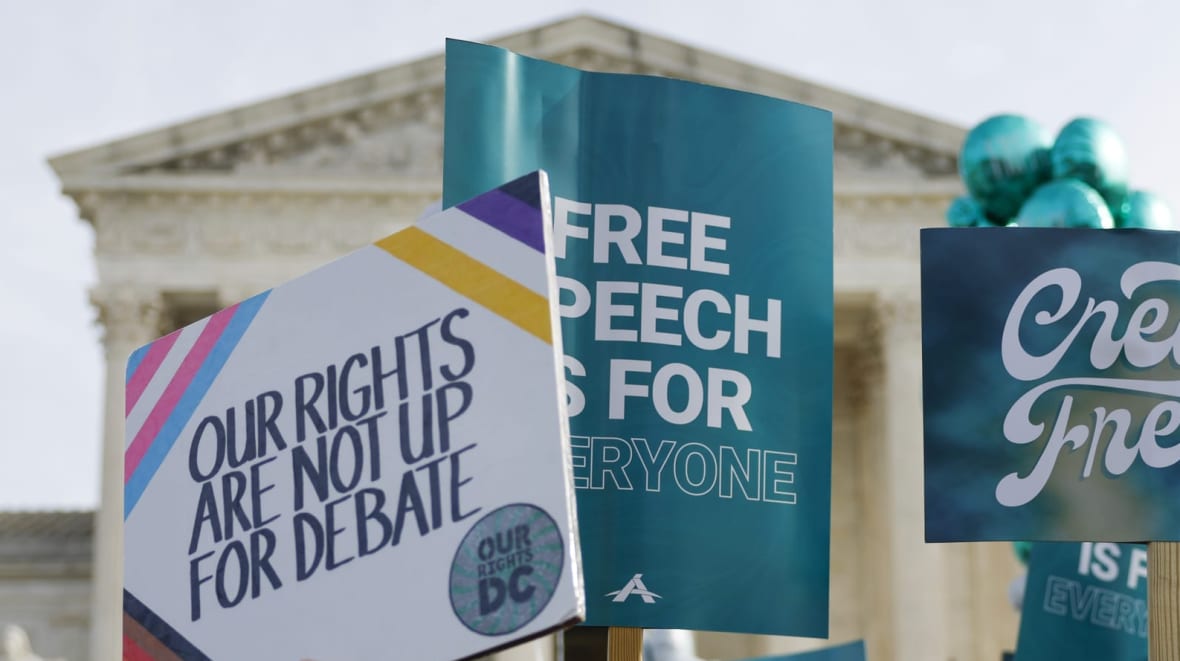The concern is great for the tentacles that could reach Black communities over the Supreme Court’s decision last week that rolled back protections for LGBTQ+ Americans.
In a 6-3 decision, the conservative majority of the high court ruled in favor of a wedding web designer who challenged the state’s Anti-Discrimination Act, arguing that it violated her First Amendment right to refuse service to same-sex couples based on her religious belief.

The three liberal justices objected to the ruling in the case 303 Creative LLC v. Elenis in a dissent written by Justice Sonia Sotomayor. The court’s only Latina justice said the decision “threatens to balkanize the market and to allow the exclusion of other groups from many services.”
Black leaders and experts expressed concern with theGrio that the court’s decision on LGBTQ+ rights could have far-reaching consequences for Black and brown communities.
Damon Hewitt, president and executive director of Lawyers’ Committee for Civil Rights Under Law, told theGrio that by ruling in favor of the plaintiff, the Supreme Court is “practically inviting people to discriminate while hiding behind freedom of speech.”
The case now gives others the “playbook and the talking points” to discriminate against other marginalized groups, said Hewitt.
The 303 Creative LLC v. Elenis case is deeply connected to the history of the civil rights movement and the fight for Black freedoms, Hewitt points out.
“If businesses are permitted to intentionally discriminate against LGBTQ+ people for reasons allegedly rooted in speech interests, they will inevitably seek to discriminate against other groups too,” said the civil rights litigator. Those seeking to discriminate against any particular group will “likely claim the right to do so using the same free-speech argument,” he said.
After the court’s decision on June 30, activists and civil rights advocates came together at the Essence Festival in New Orleans. They called for a “family meeting” of Black leaders to strategize on how to fight back against several rollbacks on freedoms that were fought for and won decades ago.
“At the federal level, civil rights laws that apply to public accommodations were instrumental in defeating Jim Crow and transforming the experience of Black people and other protected classes,” noted Hewitt.
Those advancements in public accommodations included outlawing segregated water fountains and lunch counters to banning laws that required Black people to ride the back of buses.
“These racially discriminatory practices essentially excluded Black people from the stream of commerce for generations,” he added.
Los Angeles Mayor Karen Bass called the Supreme Court’s recent decisions “egregious,” including the rulings against affirmative action and student debt forgiveness.
“[They] are essentially an attempt to undo everything we fought for over the last five decades,” Bass told theGrio.
Civil rights leader Al Sharpton expressed great concern for what the court’s ruling will mean for Black communities that have been historically oppressed and disadvantaged. As he sees it, the ruling could lead to a scenario in which business owners can say, “I don’t want Blacks in my store” or “I don’t want to have to do contracts with Blacks,” based on their free speech rights.
The reverend and activist said the court’s decisions on LGBTQ+ rights and affirmative action amid a growing conservative movement against diversity could cause great harm to Black communities and businesses.
Speaking to hypothetical cases in the future, Sharpton said, “They can say it’s unconstitutional, just like now the court has ruled. He added, “That means we don’t have to deal with Black or diversity in corporate spending and all of that.”
“We’ve got to fight back,” said Sharpton. “We’ve got to understand they’ve declared war.”
TheGrio is FREE on your TV via Apple TV, Amazon Fire, Roku, and Android TV. Please download theGrio mobile apps today!

